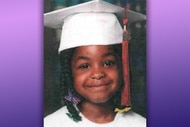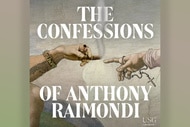Create a free profile to get unlimited access to exclusive videos, breaking news, sweepstakes, and more!
How Jermain Charlo's Disappearance In Montana Has Become A Flashpoint For Epidemic Of Missing And Murdered Indigenous Women
A new investigative podcast goes in-depth into the case of Jermain Charlo, who vanished in Montana after turning a corner down a dark alley in 2018 and has not been seen since.

For nearly three years, the family and friends of Jermain Charlo have sought answers about what happened to the young mother of two since she disappeared in the spring of 2018 after turning a corner off an alley in downtown Missoula, Montana. While they've encountered familiar obstacles with local investigators, renewed hope is emerging after a podcast investigating her case has received national attention and the Biden administration has launched a unit to tackle the epidemic of missing and murdered Indigenous women across the country.
In the podcast, “Stolen: The Search for Jermain,” which just wrapped up its eight-episode run, reporter Connie Walker headed to Montana seeking answers about Charlo and why she abruptly vanished on June 15, 2018. Walker, a Cree woman from Saskatchewan, says she sees the details of the young mother's life, the violence she endured and the response to her disappearance as reflective of both Indigenous life and an example of the scourge that’s been smoldering in North America for generations.
“This conversation is about Indigenous women and girls, but it's really a window into a bigger understanding of what Indigenous realities are and what Indigenous people are experiencing,” she told Oxygen.com in an interview this week.
Before she vanished that night, Charlo had been out with Michael Defrance, her ex-boyfriend and the father of her two boys, at a Missoula bar. In “Stolen,” listeners learn of the documented abuse that occurred between the couple. In one instance in 2013, Defrance admitted to striking her several times, including in the face. He was arrested, fined, and ordered to attend 40 hours of domestic violence treatment, Walker reported. Another documented violent incident between the couple mentioned in the series occurred while Charlo was eight-and-a-half months pregnant with their second child.
The details of partner abuse in Charlo’s story, and the struggles she and other women often have in finding proper help, are frighteningly common in Native American and First Nation communities. The statistics are staggering: in 2016, there were 5,712 reports of missing American Indian and Alaska Native women and girls, the National Crime Information Center reported; more than 2 in 5 Native American and Alaska Native female victims reported being physically injured, according to a Justice Department survey conducted the same year. Over 84% of these women have experienced violence in their lifetime, which includes 56.1% who have experienced sexual violence, according to a National Institute of Justice report. Meanwhile, over a third of these women were unable to receive necessary assistance, like legal help and medical services, according to the DOJ report.
Walker said that every single Indigenous woman or girl that she spoke with while reporting on the Flathead Reservation last year for “Stolen” told her they were a survivor of some kind of physical or sexual violence. That included Charlo’s aunt, mother, and grandmother.
“That to me was horrifying and shocking — but also familiar. This is actually a part of our shared history as Indigenous people,” she said. “Just being born an Indigenous woman in the U.S. made Jermain more likely to become a victim of violence.”
Missing person cases in Indigenous communities typically face roadblocks at the outset, as they frequently occur in relatively remote regions that fall between the cracks in local, state, tribal, and federal jurisdictions. Accounts have been given by parents of police saying young girls and women were drunk or that they'd run away. And some departments seem to have turned a blind eye to the epidemic, as indicated in a 2018 report from the Urban Indian Health Institute which looked at 71 U.S. cities; nearly 60 percent of police departments did not even respond to the UIHI’s request or returned partial or corrupted data.
Experts agree that the first 72 hours in any missing person case is an absolutely crucial period in an investigation. It took Charlo’s family five days to get her reported as missing, Walker said. At that point, a detective worked on the case for one day before Det. Guy Baker took over the case — this was “on day 11 or day 12,” she added.
Faced with similar bureaucracy and indifference, fed-up families and allies launched a grassroots movement around Murdered and Missing Indigenous Women (#MMIW) across the U.S. and Canada. Over the past five years, some traction has been gained in addressing the epidemic. This began with an inquiry into the issue from Canadian Prime Minister Justin Trudeau’s new government in 2015 and has continued, in periodic steps forward, through the April 1 announcement from the U.S. Department of the Interior of the new Missing & Murdered Unit, which intends to coordinate inter-agency collaboration and strengthen existing law enforcement resources. The unit was created by Interior Secretary Deb Haaland — the first Native American Cabinet secretary in U.S. history.
This month, Charlo’s tribe, the Confederated Salish and Kootenai, was the first to complete a community response plan in relation to the Justice Department initiative. But as the Associated Press reported, no plan is in place for when an Indigenous person disappears outside tribal lands — as was the case when Charlo vanished. Craige Couture, police chief for the Confederated Salish and Kootenai Tribes, told the AP that at some point, information and resource sharing will extend to cases beyond tribal land and across state lines.
In the meantime, the family's campaign to draw attention to Charlo’s case continues; on March 19, they organized a small rally outside the Missoula police station demanding that Defrance, who is a non-tribal citizen, be named a suspect in her disappearance. Danielle Matt Garcia, Charlo’s aunt, told the local Ravalli Republic newspaper that she questions why that hasn't been done when a search warrant filed in Missoula County indicated that her niece’s cellphone was “at or near Michael Defrance’s residence” in an eight-hour period just after her disappearance.
The frustration around this element of her case — and the many other obstacles to finding justice for missing and murdered women — permeate the eight episodes of the “Stolen” podcast. Charlo and her family’s story, however, is just one of the hundreds that have haunted Indigenous families and communities for centuries.
“There are so many women like Jermain,” Walker said. “There are so many families like Jermain’s family that are going through this — that have lost somebody — and don't have the answers they want or need, and have been denied justice in some way, shape or form."



























